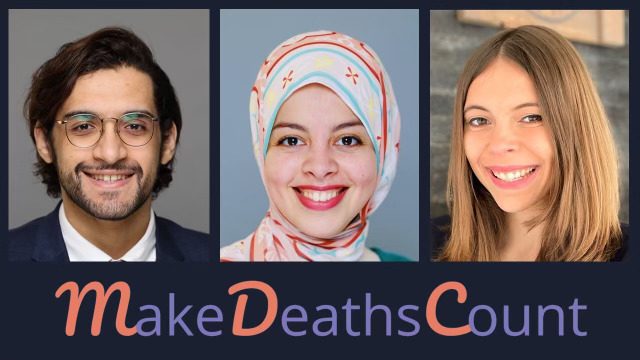YSPH student and alumni start nonprofit to improve mortality surveillance
Nonprofit organization MakeDeathsCount works to improve data collection around deaths in lower and middle-income countries.

Courtesy of MakeDeathsCount
In an age of seemingly infinite data and information, about half the deaths in the world are currently unregistered, meaning that a cause is never identified or recorded.
This is the fact that caught Ahmad Saleh MPH ’22 by surprise and spurred the creation of MakeDeathsCount, a non profit organization founded by Saleh, Madison Novosel MPH ’23 and Ehsan Abualanain MPH ’22 that works to help lower and middle-income countries develop mortality surveillance capabilities. The overall goal of the organization is to improve the documentation of deaths worldwide in order to understand the best public health practices and allocation measures to help avoid preventable deaths.
“I came to realize the huge burden of unseen data, especially for mortality, because we cannot know where to allocate resources,” Abualanain said. “We cannot know what diseases to tackle, we cannot know how people are suffering from the diseases, whether it is communicable or non communicable, if you don’t know what people are dying from.”
The venture initially began last year as a research project between Saleh and Abualanain, who were both in their last year of their masters of public health degrees and working in the lab of Kaveh Khoshnood, an associate professor of epidemiology at the Yale School of Public Health.
However, with encouragement from others, the research project eventually turned into a nonprofit non-governmental organization, working with other NGOs as well as ministries of health in lower and middle-income countries.
The organization trains people in countries around the world to conduct verbal autopsies, which are essentially interviews with those close to a recently deceased individual to obtain information about their death. This information is then fed into a machine learning algorithm to identify the most likely cause of death for that individual, which becomes recorded as data.
Access to cause of death data is important for determining what public health initiatives to implement, such as those that can help reduce the number of deaths. Novosel, who was a friend of Saleh and joined the team a few months after Saleh and Abualanain proposed the idea, is particularly interested in the burden caused by missing data and how more data could be used.
“If a lot of people in a region are dying of COVID-19, maybe we should focus more on initiatives like getting more COVID-19 vaccines,” Novosel said. “Another example is if maternal mortality is really high, then the focus is more on something like infrastructure, hospitals.”
While the team first focused on Syria for their research, they decided that they could expand this idea to other low and middle-income countries when turning it into an official organization.
“We kind of realized that this was an issue worldwide,” Saleh said. “We realized that we didn’t want to just have our end product be a publication. We wanted to have kind of an implementation, a real world impact.”
MDC is now in talks with different nonprofit organizations in Somalia, India and Colombia with the goal of establishing new partnerships within the next two months.
Saleh contrasted the mortality recording system in high-income countries with the rest of the world. He noted that in the United States, for example, most people pass away in hospitals where there is an attending physician that signs a certificate of death with the cause of death written on it.
According to Saleh, a Central Registry and Vital Statistics system includes a mortality surveillance system that allows public health authorities and other relevant individuals to know the cause of death in each case.
“The reality is in many places, almost over a hundred low and middle income countries in the world, there is an incomplete CRVS system,” Saleh said.
The primary goal of MDC is to empower countries without a CRVS system or only a partial system to develop better mortality surveillance structures, with the long-term hope of developing full CRVS systems.
Saleh noted how MDC can also provide an emotional benefit to families and communities in these countries in addition to helping public health officials make more informed decisions.
“Being able to tell somebody’s loved one, or tell a community, what people have died from … provides such closure that you can’t really put words on it,” Saleh said.
In the academic year 2022-2023, there are 615 students enrolled full-time at YSPH.







